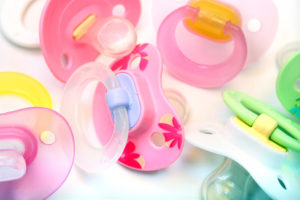
Many parents with new babies are constantly on the lookout for soothing strategies to help calm their babies and reduce crying and fussiness. Often parents turn to pacifiers to help with soothing, but they may also be hesitant because of concerns about their baby’s oral development. So, are pacifiers bad for teeth? The answer depends on several factors.
Are Pacifiers Bad for Teeth?
Early on, pacifiers often have more benefits than downsides. When used before six months old, pacifiers can:
- Soothe fussiness
- Help babies fall asleep
- Ease or distract from discomfort
- Reduce the risk of Sudden Infant Death Syndrome (SIDS)
These are the reasons most parents give their babies pacifiers in the first place, but many of these benefits wane as the baby gets older. The longer a baby uses a pacifier, the more issues can arise. After six months, your baby’s pacifier could increase the chance of middle ear infections. After your baby’s first birthday, it could begin to impact the way that their baby teeth come in. Using a pacifier beyond age two can even affect the way your child’s mouth develops and cause significant misalignment.
What Does Pacifier Teeth Mean?
The term “pacifier teeth” refers to oral development that has been impacted by pacifier use, often including teeth, a palate, and a bite that are malformed. While pacifier teeth aren’t much of a concern until after your baby’s first birthday, they can become a significant concern if a pacifier is used after age two. Pacifier teeth damage can appear in a number of different ways, including:
- Buck teeth: When the front teeth protrude.
- Changes to the shape of the mouth: Among the more serious pacifier issues, these can include a narrowing of the width between your top molars, or narrowing of the roof of the mouth, which can also cause a narrowing of the airway.
- Open bite: A misalignment in which the front teeth on the top and bottom are angled outward to accommodate the pacifier. The teeth may not close completely or touch, even when the mouth is closed. There may also be large spaces between the front teeth.
- Overbite: When the front top teeth cover the bottom front teeth more than they should.
- Posterior crossbite: A misalignment occurring when the front teeth are an overbite, but the molars are an underbite.
When Does Pacifier Teeth Damage Start?
While most of these changes in oral development begin after age two, the American Academy of Family Physicians points out that they are most evident after four years. Another meta-analysis notes that pacifier use beyond age three has increasingly harmful effects on oral development, with even more severe effects with pacifier use after age five.
So, while it’s most helpful to wean your baby off of the pacifier after six months, at which point the sucking reflex will have dissipated, it’s essential to stop using a pacifier by age two to reduce the likelihood of pacifier teeth damage. Additionally, the younger your child is, the easier the pacifier weaning process will be. You may need to get through a couple fussy nights or missed naps, but the rewards are worthwhile when you consider the damage that could be done later to your child’s mouth and teeth.
How To Fix Pacifier Teeth
If you’re wondering how to fix pacifier teeth, the first thing you can do is to prevent pacifier teeth in the first place. Choosing to forgo a pacifier altogether is one option, although it’s helpful to remember that a pacifier is preferable to finger or thumb sucking. If your baby sucks their fingers or thumb, they’re more likely to continue the habit. If you do give your baby a pacifier, choose an orthodontic pacifier if possible. These pacifiers are flatter, rather than round, and allow your baby’s jaws to align properly while sucking.
From there, you can prevent pacifier teeth by weaning your baby off of the pacifier as soon as possible. If you’re able to wean your baby from using a pacifier around six months, you won’t have to worry about pacifier teeth damage; and if you can wean your baby by their first birthday, you’re still likely to avoid lasting impacts. Between age one and two, any misalignment that begins should self-correct if you wean your baby off the pacifier before age two.
After age two, things get a little more complicated because any misalignment or oral development impacts become harder to fix. The longer pacifier use continues, the greater those negative impacts become. By age three or four, the negative effects on your child’s oral development are likely to require some kind of intervention. You may need to see a pediatric orthodontist or your child may need myofunctional therapy to improve tongue position and swallowing patterns.
Pacifier Teeth Could Impact Your Child’s Health
Pacifier teeth damage is problematic enough on its own. However, problems with your child’s oral development can also cause other, more serious, problems down the road including:
- Eating difficulties: Caused by problems with oral development.
- Narrowing of the airways: Caused by changes in the development of the roof of the mouth.
- Speech problems: Caused by oral development problems.
- Social impacts and bullying: Caused by teasing about extended pacifier use, speech problems, and misaligned teeth.
Avoiding negative health impacts is ideal, of course, but particularly when you consider that each aspect of your health can impact another. Problems with your child’s oral health are reason enough to stop pacifier use early, but knowing pacifier-induced dental health problems could eventually impact the rest of your child’s health and well being are even more motivation.
To learn more about how each aspect of our health is interconnected, reserve your copy of If Your Mouth Could Talk, by dental expert, dentist, and dad, Dr. Kami Hoss. Protecting your child’s oral health could ultimately help protect their overall health and help ensure that they have a healthier, happier life ahead of them.
Sources:
https://www.aafp.org/afp/2009/0415/p681.html
https://pubmed.ncbi.nlm.nih.gov/17256438/
https://askthedentist.com/pacifiers/
https://foxkidsdentistry.com/blog/do-pacifiers-cause-dental-problems/

